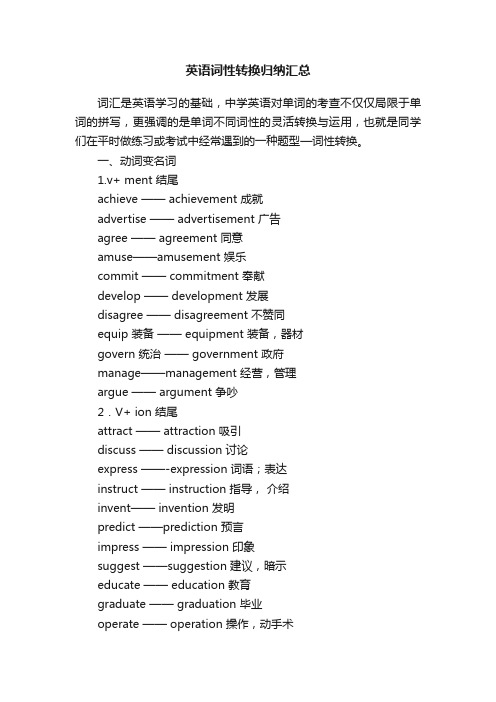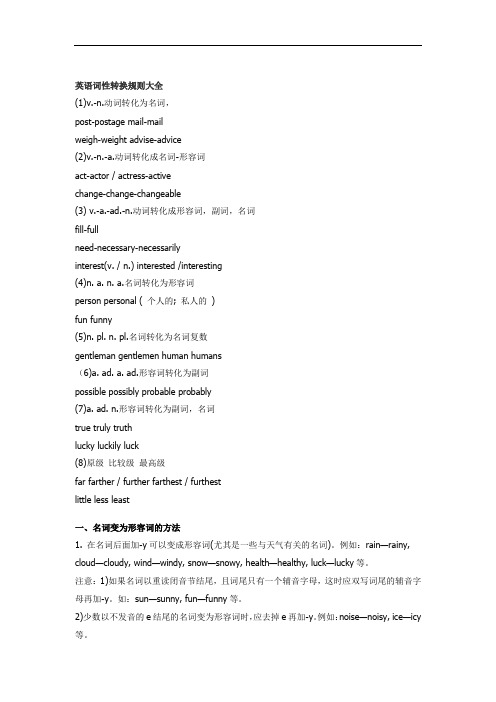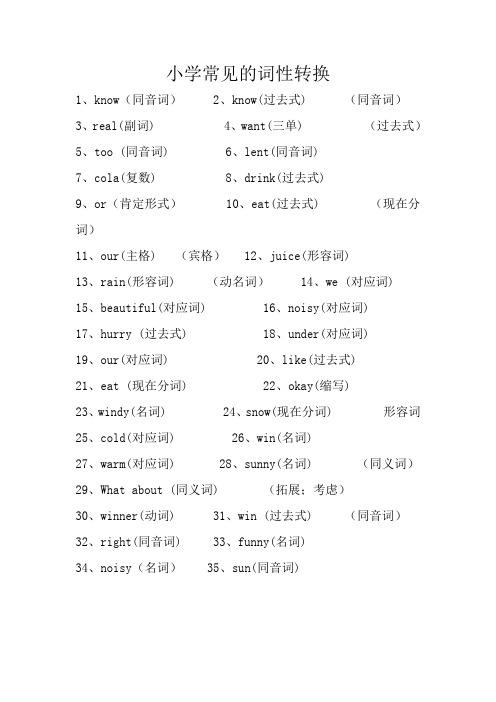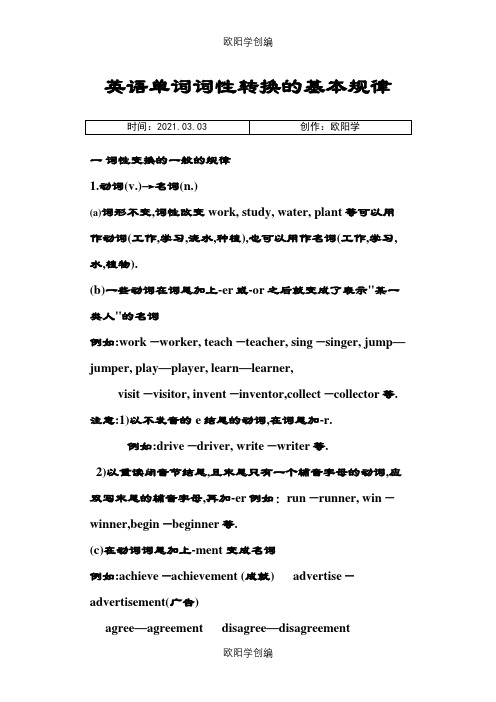小学英语词性转换
小学英语词性转换归纳总结

动词变名词1. V+ ment 结尾achieve —— achievement 成就advertise —— advertisement 广告agree —— agreement 同意amuse——amusement 娱乐commit —— commitment 承诺,奉献develop —— development 发展disagree —— disagreement 不赞同equip 装备—— equipment 装备,器材govern 统治—— government 政府manage——management 经营,管理argue —— argument 争吵2. V+ ion 结尾attract —— attraction 吸引discuss —— discussion 讨论express ——-expression 词语;表达instruct —— instruction 用法说明invent—— invention 发明predict ——prediction 预言impress —— impression 印象suggest ——suggestion 建议,暗示educate —— education 教育graduate —— graduation 毕业operate —— operation 操作,动手术illustrate —— illustration 阐明,举例说明pollute —— pollution 污染introduce ——introduction 介绍organize ——organization组织imagine —— imagination 想象力inspire——inspiration 灵感,鼓舞人心的事invite —— invitation 邀请compete —— competition 竞争,比赛pronounce ——pronunciation发音admit —— admission 承认permit —— permission 允许conclude —— conclusion 结论decide —— decision 决定describe —— description描写,描绘resolve —— resolution 决心solve ——solution 解决方法3. V+ ance 结尾allow —— allowance 允许appear —— appearance 外貌,出现perform —— performance 演出exist —— existence 存在4. V+ ing 结尾end —— ending 结尾,结局train ——training训练mean —— meaning 意义say—— saying 谚语remind —— reminding提醒bathe ——bathing沐浴5. 词尾加-er或-or后变成表示“某一类人”的名词work——worker 工人teach——teacher老师sing——singer 歌手jump——jumper跳高运动员play——player表演者、运动员learn——learner 学习者visit——visitor访问者invent——inventor发明家6. V+ 其他beg——beggar 乞丐sit——seat 座位believe —— belief 信仰behave —— behavior 行为know—— knowledge 知识fly—— flight 飞行mix —— mixture 混合物press —— pressure 压力serve —— service 服务succeed ——success 成功pursue —— pursuit 追求,从事propose —— proposal 建议withdraw —— withdrawal 取钱;收回;撤退survive —— survival--survivor 幸存者arrive —— arrival到达analyze —— analysis 分析形容词变名词1. 词尾ent改为ency或enceefficient有效率的——efficiency 效率patient——patience/impatience 耐性/无耐心dependent——dependence依赖性independent——independence 独立性urgent——urgency 紧急2. ble结尾,ble改为bilitypossible——possibility 可能responsible——responsibility 责任;职责3. 其他accurate——accuracy 准确性prosperous——prosperity 繁荣true——truth 真相wide——width 宽度long——length 长度high——height 高度名词/动词变形容词1. 名词+yguilt 罪恶——guilty 内疚的health——healthy 健康的luck——lucky 幸运的cloud——cloudy 多云的wind—windy 多风的rain——rainy 多雨的snow——snowy 多雪的tourist —— touristy 游客多的(er结尾,改er为ry)hunger——hungry 饥饿的anger —— angry 生气的fog—— foggy 有雾的sun—— sunny 阳光灿烂的fur—— furry 毛皮的shine——shiny 发亮的taste —— tasty 美味的2. 名词/动词+ ed(以辅音+辅音结尾的单词,直接加ed)talent —— talented 有天赋的offend ——offended 生气的crowd ——crowded 拥挤的(以元音字母e结尾的单词直接加d)balance —— balanced 平衡的organize——organized 有组织的pollute ——polluted 被污染的please ——pleased 高兴的(元音加辅音结尾的单词,词尾辅音双写再加ed) spot —— spotted 有斑点的3. 名词+ ful/lesscare —— careful/ careless 小心的/ 粗心的help—— helpful / helpless 有帮助的/ 无助的use—— useful/ useless有用的/ 无用的meaning —— meaningful / meaningless有意义的/无意义的colour—— colourful /colourless多彩的/无色的pain 疼痛——painful /painless痛苦的/ 不痛的thank—— thankful / thankless 充满感激的/ 不知感恩的peace 和平—— peaceful 和平的play游戏—— playful 爱玩耍的home —— homeless 无家可归的4. 名词/动词+ ablechange —— changeable 易变的adjust——adjustable 可调整的comfort——comfortable 舒适的knowledge——knowledgeable 知识渊博的suit ——suitable 合适的(动词以辅音加y结尾把y变i 加able)deny—— deniable 可否认的rely—— reliable 可靠的5. 名词+ ouscourage——courageous 勇敢的danger—— dangerous 危险的(以y结尾,改y为i再加ous)mystery 神秘—— mysterious 神秘的6. ce 变tconfidence—— confident 自信的difference——different 不同的dependence —— dependent 依赖他人的independence—— independent 独立的7. 词尾加aladdition—— additional 附加的,额外的music—— musical 音乐的person——personal (私人的)nation—— national 国家的education——educational有教育意义的tradition—— traditional 传统的origin起源——original 新颖的;独创的(以元音字母e 结尾的单词,去掉词尾元音加al)nature——natural 自然的globe—— global 全球的特例:class—— classical 经典的medicine 药——medical 医学的grammar—— grammatical 语法的8. 名词+ lyfriend—— friendly 友好的live——lively 活跃的,有生气的love——lovely 可爱的week——weekly 每周的man——manly 男子气概的;强壮的9. 词尾+ enwood—— wooden 木制的wool—— woolen 羊毛的10. 表示方位的词East——easternWest——westernSouth——southern North——northern11. 四大洲亚洲—— AsianAfrica非洲——AfricanEurope欧洲—— EuropeanAmerica美洲——American12. 其他energy精力——energetic 精力充沛的strategy——strategic 战略的scientist——scientific 科学的fool 傻子——foolish 愚蠢的love——loving 慈爱的pleasure——pleasant令人愉快的/ pleased高兴的pride——proud 自豪的形容词变动词1. 词尾加izemodern——modernize 使...现代化social——socialize 使...社会化2. 词尾加enfast——fasten 使固定;集中于short—— shorten 缩短wide——widen 放宽less——lessen 使...减少特例(有变形):long——lengthen 使延长strong ——strengthen 加强;巩固3. 词前加enlarge —— enlarge 扩大;放大形容词变副词1. 形容词+ lybad——badly 坏地bright——brightly 明亮地casual——casually 随意地clear——clearly 清楚地complete——completely 完全correct——correctly 正确地final——finally 最后fortunate——fortunately幸运地general——generally 一般来讲loud——loudly 大声地particular ——particularly特别地polite——politely 礼貌地proper ——properly适当地main——mainly 主要地most ——mostly 多半,大多数normal——normally 正常地quick——quickly 迅速地quiet——quietly 轻轻地,安静地real——really 真正地recent ——recently 最近;近来sad——sadly 悲哀地slow——slowly 缓慢地special——specially 专门,特殊地specific——specifically 特定地,明确地strong——strongly 坚决地,强烈地sudden——suddenly突然usual——usually 通常2. 以le 结尾的,去e + ycomfortable——comfortably 舒服地gentle——gently 温柔地possible——possibly 可能地simple——simply 仅仅;只;简单地terrible——terribly 非常;极度地3. 辅音字母+ y 变y为ilyeasy——easily 容易地heavy——heavily 沉重地happy——happily 快乐地4. 特殊good——well好的true——truly 真实地。
英语词性转换归纳汇总

英语词性转换归纳汇总词汇是英语学习的基础,中学英语对单词的考查不仅仅局限于单词的拼写,更强调的是单词不同词性的灵活转换与运用,也就是同学们在平时做练习或考试中经常遇到的一种题型—词性转换。
一、动词变名词1.v+ ment 结尾achieve —— achievement 成就advertise —— advertisement 广告agree —— agreement 同意amuse——amusement 娱乐commit —— commitment 奉献develop —— development 发展disagree —— disagreement 不赞同equip 装备—— equipment 装备,器材govern 统治—— government 政府manage——management 经营,管理argue —— argument 争吵2.V+ ion 结尾attract —— attraction 吸引discuss —— discussion 讨论express ——-expression 词语;表达instruct —— instruction 指导,介绍invent—— invention 发明predict ——prediction 预言impress —— impression 印象suggest ——suggestion 建议,暗示educate —— education 教育graduate —— graduation 毕业operate —— operation 操作,动手术illustrate —— illustration 阐明,举例说明pollute —— pollution 污染introduce ——introduction 介绍organize ——organization组织imagine —— imagination 想象力inspire——inspiration 灵感,鼓舞人心的invite —— invitation 邀请compete —— competition 竞争,比赛pronounce ——pronunciation发音admit —— admission 承认permit —— permission 允许conclude —— conclusion 结论decide —— decision 决定describe —— description描写,描绘resolve —— resolution 决心solve ——solution 解决方法3.V+ ance 结尾allow —— allowance 允许appear —— appearance 外貌,出现perform —— performance 演出exist —— existance 存在4.V+ ing 结尾end —— ending 结尾,结局train ——training训练mean —— meaning 意义say—— saying 谚语remind —— reminding提醒bathe ——bathing沐浴5.词尾加-er或-or后变成表示“某一类人”的名词work——worker 工人teach——teacher老师sing——singer 歌手jump——jumper跳高运动员play——player表演者、运动员learn——learner 学习者visit——visitor访问者invent——inventor发明家6.V+ 其他beg——beggar 乞丐sit——seat 座位believe —— belief 信仰behave —— behavior 行为know—— knowledge 知识fly—— flight 飞行mix —— mixture 混合物press —— pressure 压力serve —— service 服务succeed ——success 成功pursue —— pursuit 追求,从事propose —— proposal 建议withdraw —— withdrawal 取钱;收回;撤退survive —— survival--survivor 幸存者arrive —— arrival到达analyze —— analysis 分析形容词变名词1.词尾ent改为ency或enceefficient有效率的——efficiency 效率patient——patience/impatience 耐性/无耐心dependent——dependence依赖性independent——independency 独立性urgent——urgency 紧急2.ble结尾,ble改为bilitypossible——possibility 可能responsible——responsibility 责任;职责3.其他accurate——accuracy 准确性 prosperous——prosperity 繁荣 true——truth 真相wide——width 宽度long——length 长度high——height 高度二、名词/动词变形容词1.名词+yhonest —— honesty 诚实的guilt 罪恶——guilty 内疚的health——healthy 健康的luck——lucky 幸运的cloud——cloudy 多云的wind—windy 多风的rain——rainy 多雨的snow——snowy 多雪的tourist —— touristy 游客多的 er结尾,改er为ryhunger——hungry 饥饿的anger —— angry 生气的 fog—— foggy 有雾的sun—— sunny 阳关灿烂的fur—— furry 毛皮的 shine——shiny 发亮的taste —— tasty 美味的2. 名词/动词+ ed 以辅音+辅音结尾的单词,直接加edtalent —— talented 有天赋的offend ——offended 生气的crowd ——crowded 拥挤的以元音字母e结尾的单词直接加dbalance —— balanced 平衡的organize——organized 有组织的pollute ——polluted 被污染的please ——pleased 高兴的元音加辅音结尾的单词,词尾辅音双写再加edspot —— spotted 有斑点的 3.名词+ ful/lesscare —— careful/ careless 小心的/ 粗心的help—— helpful / helpless 有帮助的/ 无助的use—— useful/ useless有用的/ 无用的meaning —— meaningful / meaningless有意义的/无意义的colour—— colourful /colourless多彩的/无色的pain 疼痛——painful /painless痛苦的/ 不痛的thank—— thankful / thankless 充满感激的/ 不知感恩的 peace 和平—— peaceful 和平的play游戏—— playful 爱玩耍的home —— homeless 无家可归的 4.名词/动词+ ablechange —— changeable 易变的adjust——adjustable 可调整的comfort——comfortable 舒适的knowledge——knowledgeable 知识渊博的suit ——suitable 合适的动词以辅音加y结尾把y变i 加able ,deny—— deniable 可否认的rely—— reliable 可靠的 5.名词+ ouscourage——courageous 勇敢的danger—— dangerous 危险的以y结尾,改y为i再加ousmystery神秘—— mysterious 神秘的 6.ce 变 tconfidence—— confident 自信的difference——different 不同的dependence —— dependent 依赖他人的independence—— independent 独立的 7.词尾加 aladdition—— additional 附加的,额外的music—— musical 音乐的person——personal (私人的)nation—— national 国家的education——educational有教育意义的tradition—— traditional 传统的origin起源——original 新颖的;独创的以元音字母结尾的单词,去掉词尾元音加alnature——natural 自然的globe—— global 全球的特例:class—— classical 经典的medicine 药——medical 医学的grammar—— grammatical 语法的 8.名词+ lyfriend—— friendly 友好的live——lively 活跃的,有生气的love——lovely 可爱的week——weekly 每周的man——manly 男子气概的;强壮的 9.词尾+ enwood—— wooden 木制的wool—— woolen 羊毛的 10. 表示方位的词East——easternWest——westernSouth——southernNorth——northern 11.四大洲Asia 亚洲—— AsianAfrica 非洲——AfricanEurope欧洲—— EuropeanAmerica 美洲——American 12. 其他energy精力——energetic 精力充沛的strategy——strategic 战略的scientist——scientific 科学的 fool 傻子——foolish 愚蠢的love——loving 慈爱的pleasure——pleasant 令人愉快的 / pleased高兴的pride——proud 自豪的三、形容词变动词1.词尾加izemodern——modernize 使...现代化social——socialize 使...社会化2.词尾加enfast——fasten 使固定;集中于short—— shorten 缩短wide——widen 放宽less——lessen 使...减少特例(有变形):long——lengthen 使延长strong ——strengthen 加强;巩固3.词前加enlarge —— enlarge 扩大;放大四、形容词变副词1.形容词+ lybad——badly 坏地bright——brightly 明亮地casual——casually 随意地clear——clearly 清楚地complete——completely 完全correct——correctly 正确地final——finally 最后fortunate——fortunately幸运地general——generally 一般来讲loud——loudly 大声地particular ——particularly特别地polite——politely 礼貌地proper ——properly适当地main——mainly 主要地most ——mostly 多半,大多数normal——normally 正常地quick——quickly 迅速地quiet——quietly 轻轻地,安静地real——really 真正地recent ——recently 最近;近来sad——sadly 悲哀地slow——slowly 缓慢地special——specially 专门,特殊地specific——specifically 特定地,明确地strong——strongly 坚决地,强烈地sudden——suddenly突然usual——usually 通常 2. 以le 结尾的,去e + ycomfortable——comfortably 舒服地gentle——gently 温柔地possible——possibly 可能地simple——simply 仅仅;只;简单地terrible——terribly 非常;极度地 3. 辅音字母+ y 变y 为 ilyeasy——easily 容易地heavy——heavily 沉重地happy——happily 快乐地 4.特殊good——well好地true——truly 真实地。
(完整版)英语词性转换大全

(完整版)英语词性转换大全英语词性转换1. 名词变形容词(a)在名词后面加-y可以变成形容词(尤其是一些与天气有关的名词)例如:rain—rainy,cloud—cloudy,wind—windy,snow—snowy,health—healthy,luck—lucky,anger—angry guilt—guilty (内疚的)tourist—touristy(游客多的),salt (盐)—salty (咸的)silk(丝绸)—silky(丝绸般的),sleep—sleepy (昏昏欲睡的)注意:1)如果以重读闭音节结尾,且词尾只有一个辅音字母,这时应双写辅音字母再加“-y”。
如:sun—sunny,fun—funny,fog—foggy(有雾的),fur—furry(毛皮的)2)少数以不发音的e结尾的名词变为形容词时,应去掉e再加“-y”。
如:noise—noisy,ice—icy,shine—shiny(发亮的),taste (口味)—tasty(甜的)(b)名词后面加-ed,以e结尾的直接加d。
例如:spot(斑点)—spotted(有斑点的);talent—talented (有天赋的)organize—organized 有组织的;balance—balanced (平衡的)(c)一些抽象名词在词尾加-ful可以变为形容词例如:care—careful,thank—thankful,help—helpful,use—useful,meaning—meaningful(d)在名词后加-less构成含有否定意义的形容词例如:care—careless(粗心的),use—useless(无用的)hope—hopeless(没希望的),home—homeless(无家可归的)(e)一些以-ce结尾的名词,把-ce改为-t变成形容词例如:difference—different,silence—silent,confidence—confident(f)。
英语单词词性转换

英语单词词性转换一、动词v.→名词n.1、词尾加上-er或-or之后就变成了表示"某一类人"的名词例如:work—worker, teach—teacher, sing—singer,jump—jumper, play—player, learn—learner,visit—visitor, invent—inventor,collect—collector等.注意:1以不发音的e结尾的动词,在词尾加-r.例如:drive—driver, write—writer等.2以辅音字母开头并以元音字母加辅音字母结尾的单词,应双写末尾的辅音字母再加er; 例如:run—runner, win—winner,begin—beginner等.2.在动词词尾加上-ment 变成名词例如:achieve—achievement 成就advertise—advertisement例如:argue—argument争论3.在动词词尾加上-tion/sion变成名词例如: attract—attraction; instruct—instruction;invent—invention discuss—discussion;express—expression educate—education;graduate—graduation; operate—operation 去e再加"ion"compete—competition; organize—organization 把e改成其他字母再加"tion"decide—decision conclude—conclusion 把de改为s再加"ion"describe—description描写,描绘这是特例,不规则变化4.在动词词尾加上-ance变成名词例如: appear—appearance 外貌;出现perform—performance 演出accept—acceptance 接受resist-resistance n.抵抗,阻力5.在动词词尾加-ing变成名词方法与动词变为现在分词的方法相同例如:meet—meeting build—building wait—waitingbathe—bathing say—saying谚语 mean—meaning注意:以辅音字母开头并以元音字母加辅音字母结尾的单词,应双写末尾的辅音字母再加-ing 如:swim—swimming shop—shopping begin—beginning二、动词v.→形容词adj.1.动词后面加able,以e结尾的动词则去e加able,表示具有此性质,特点或属性.例如: afford-affordable;love-lovable2.动词后面加ed,以e结尾的动词则直接加d,表示被动性的属性或特点.例如: scatter-scattered use-used3不规则的动词则必须记忆,记住其过去分词形式.规律不大,意义同b.三.名词n.→形容词adj.1.在名词后面加-y可以变成形容词尤其是一些与天气有关的名词例如: rain—rainy, cloud—cloudy, wind—windy, snow—snowy,health—healthy, luck—lucky,anger—angry guilt—guilty内疚的tourist—touristy游客多的 , salt 盐—salty 咸的silk丝绸—silky丝绸般的, sleep—sleepy 昏昏欲睡的注意:1如果以辅音字母开头并以元音字母加辅音字母结尾,这时应双写辅音字母再加"-y".如: sun—sunny, fun—funny, fog—foggy有雾的, fur—furry毛皮的2少数以不发音的e结尾的名词变为形容词时,应去掉e再加"-y".如: noise—noisy, ice—icy, shine—shiny发亮的, taste口味—tasty甜的2.名词后面加-ed,以e结尾的直接加d.例如: spot斑点—spotted有斑点的; talent—talented 有天赋的organize—organized 有组织的; balance—balanced平衡的3.一些抽象名词在词尾加-ful可以变为形容词例如:care—careful, thank—thankful, help—helpful,use—useful, meaning—meaningful4.在名词后加-less构成含有否定意义的形容词例如:care—careless粗心的, use—useless无用的hope—hopeless没希望的,home—homeless无家可归的5.一些以-ce结尾的名词,把-ce改为-t变成形容词例如: difference—different, silence—silent, confidence—confident 6.在名词后加-ly变为形容词例如: friend—friendly, love—lovely, live---lively7.在名词后加-ous变为形容词例如: danger—dangerous prosperous a 繁荣的pro 在前+sper 希望+ous 8.名词后面加-al变为形容词例如: music—musical; medicine—medical 这个比较特殊9名词后面加-able变为形容词,如果以e结尾就去e再加"-able".例如: adjust—adjustable 可调整的 value—valuable有价值的10.名词后面加-en变成形容词例如: wood—wooden 木制的 wool—woolen 羊毛的四.形容词adj.→副词adv.▲一般在形容词的词尾加-ly可以变成副词例如: quick—quickly, slow—slowly, loud—loudly, sudden—suddenly 等例如:possible—possibly, terrible—terribly。
完整版)英语词性转换大全

完整版)英语词性转换大全English Word Class n1.Nouns to Adjectivesa) Adding -y to a noun can turn it into an adjective。
especially for weather-related nouns。
For example: rain - rainy。
cloud - cloudy。
wind - windy。
snow - snowy。
health - healthy。
luck - lucky。
anger - angry。
guilt - guilty。
tourist - touristy。
salt - salty。
silk - silky。
sleep - sleepy.Note: 1) If the noun ends in a stressed。
closed XXX at the end。
double the consonant and add -y。
For example: sun - sunny。
fun - funny。
fog - foggy。
fur - furry。
2) For XXX "e"。
remove the "e" and add -y。
such as noise - noisy。
ice - icy。
shine - shiny。
taste - tasty.b) Adding -ed to a noun can turn it into an adjective。
ForXXX "e"。
simply add -d。
such as spot - spotted。
talent - talented。
organize - organized。
balance - balanced.c) Adding -ful to some abstract nouns can turn them into adjectives。
(完整版)英语词性转换课件

英语单词词性转换的基本规律。
动词(v.)→名词(n。
)(a)词形不变,词性改变例如:work, study, water, plant等可以用作动词(工作,学习,浇水,种植),也可以用作名词(工作,学习,水,植物).(b)一些动词在词尾加上-er或-or之后就变成了表示”某一类人”的名词例如:work-worker, teach—teacher, sing—singer,jump-jumper, play—player, learn—learner,visit—visitor, invent—inventor,collect—collector等.注意:1)以不发音的e结尾的动词,在词尾加-r。
例如:drive-driver, write—writer等.2)以重读闭音节结尾,且末尾只有一个辅音字母的动词,应双写末尾的辅音字母,再加-er例如:run—runner, win—winner,begin—beginner等。
(c)在动词词尾加上-ment 变成名词例如:achieve—achievement (成就)advertise—advertisement//advertising(广告)agree—agreement disgree—disagreementamuse-amusement (娱乐) improve-improvement(争吵)commit(奉献)—commitment develop-development (发展)depart—department (局,部) govern(统治)-government(政府)manage—management (管理) equip-equipment (装备)有些单词比较特殊,需把动词后的e去掉再加ment。
例如:argue-argument(争论)(d)在动词词尾加上-(t)ion/(s)ion变成名词例如: attract—attraction; instruct—instruction;invent-invention discuss—discussion;express—expression educate—education;graduate-graduation; operate—operation (去e再加”ion")compete—competition; organize—organization (把e改成其他字母再加”tion”)decide—decision conclude—conclusion (把de改为s再加"ion”)describe-description描写,描绘(这是特例,不规则变化)(e)在动词词尾加上—ance变成名词例如: appear-appearance (外貌;出现)perform—performance (演出)accept—acceptance (接受)(f)在动词词尾加-ing变成名词 (方法与动词变为现在分词的方法相同)例如:meet—meeting build-building wait—waiting bathe—bathing say—saying(谚语) mean—meaningend —ending train —training wash—washing注意:以重读闭音节结尾,且末尾只有一个辅音字母的动词,应双写末尾的辅音字母,再加-ing如:swim—swimming shop—shopping begin—beginning(g)其他一些比较特殊的变化例如: Beg(乞讨)—beggar(乞丐) behave(行为举止)—behaviorknow(知道)—knowledge(知识) fly—flight (飞行)heat (加热)-heat(热量) hit (撞击)—hit( 轰动一时的人或物,碰撞)mix (混合)-mixture(混合物) press(按,压)—pressure(压力)sit(坐)—seat (座位) succeed-success(成功)tour—tour(旅游)/ tourist (游客)2。
冀教版小学英语词性转换归

冀教版小学英语词性转换归fall(同义词) three(同音词) four(同音词)in(反义词) cold(反义词) white(反义词)this(反义词) this(复数) are(过去式)is(复数) is(过去式) warm(反义词)rainy(名词) sun(同音词) sunny(名词)wind(形容词) blow(单三形式) leaves(单数)off(反义词) some(反义词) same(反义词)cloth(复数) put on(反义词) have(单三形式)slow(形容词) Friday(缩写) nine(序数词)get(现在分词) mitts(完全形式) they(形性物主代词) he(物主代词) too(同音词)look out(同义词) fall(现在分词) skate(动名词) can(同义词) teacher(动词) outside(反义词) I(形性物主代词) hat(同义词)there(反义词) go outside(反义词) snowman(复数) make(现在分词) china(形容词)first(基数词) big(反义词) top(反义词)eye(同音词) forwards(反义词)skate(复数) stand up(反义词) slow(副词) do(过去式) fast(同义词) sit(现在分词) run(现在分词) fly(现在分词)fly(单三形式) right(同音词) ask(反义词)below(反义词) come(反义词) light(反义词)on(反义词) invite(名词) grandpa(完全形式) grandma(完全形式) have fun(同义) eat(过去式) bring(过去式) shop(现在分词) big(反义词)store(同义词) fun(形容词) something(缩写) will(过去) buy(过去式)put(现在分词) open(反义词) people(复数)sheep(复数) shine(过去式) see(过去式)know(过去式) shine(现在分词) teach(过去式) morning(反义词) good(比较级) good(最高级) run(名词) throw(反义词)hard(反义词) easy(副词) hit(现在分词) go(过去式)hurt(过去式 )play(名词) think(过去式) can(过去式)up(反义词) are(过去式) win(过去式) watch(过去式)lose(过去式) sandwich(复数) today(反义词) this(反义词)this(复数) that(复数) these(反义词) is(复数) Canada(缩写) I(宾格) live(单三形式) in(反义词)today(反义词) September(缩写) twenty(序数词) arrive(反义词) there(反义词)it's(完全形式) where(同音词) pair(同音词) don't(完全形式) do(过去式) I'm(完全形式) I(物主代词) my(名性物主代词)you(名性物主代词) I(复数) mother(口语) cold(反义词) hot(反义词) wash(单三形式) dish(复数)on(反义词) put(现在分词) let's(完全形式) some(同义词) dirty(反义词)can(同义词) tooth(复数) dry(反义词) make(现在分词)supper(同义词) hungry(反义词) for(同音词)pass(单三形式) father(口语) watch(单三形式) picture(同义词) they(宾格)sit(现在分词) sister(反义词) loud(副词) quietly(形容词) loud(反义词) write(同音词)he(物主代词) fun(形容词)open(反义词)right(反义词 )who's(同音词) below(反义词)bus(复数) rain(形容词) sun(形容词)day(复数) driver(动词) dress(复数) with(反义词) ask(反义词) class(复数)Chinese(名词) cities(单数) south(反义词) come(过去式) miss(单三形式 ) do(单三形式) same(反义词) come(过去式)twelve(序数词) teach(名词) teach(单三形式) get(现在分词) cool(反义词) outside(反义词) big(比较) big(反义词)men(复数) child(复数) women(复数)people(复数) sheep(复数) family(复数) baby(复数) country(复数) run(现在分词) run(动名词) either(同音词) will(过去式)buy(过去式) teach(过去式) thi去式)learn(同义词) can(过去式) see(过去式) pair(同音词) some(同义词)these(反义词) much(比较级) many(同义词) throw(反义词) five(序数词) heavy(反义词)easy(副词) hit(现在分词)have fun(同意词 )win(过去式) lose(过去式) officer(动词) put(现在分词) right(反义词) boy(复数) bike(同音词)sun(同音词) go(过去分词) do(过去分词) smile(同义词) smile(反义词) go(过去式) there(同音词) white(反义词) leaves(单数) mitten(同义词) snowy(名词) ninth(基数词)they(物主代词) look out(反义词组) skate(现在分词) in(反义词) why(反义词) forget(反义词) forget(过去式) fun(形容词) small(比较急) top(反义词) wind(形容词) we(宾格)us(单数) swim(现在分词) does(过去式) toothbrush(复数) mitten(缩写) something(缩写) nose(同音词) strawberry(复数) box(复数) come(反义词 foot(复数) it(复数) have(过去式) expensive(反义词) quickly(反义词) fast(同义词)get(反义词) fly(单三形式)。
小学英语词性转换

资料范本本资料为word版本,可以直接编辑和打印,感谢您的下载小学英语词性转换地点:__________________时间:__________________说明:本资料适用于约定双方经过谈判,协商而共同承认,共同遵守的责任与义务,仅供参考,文档可直接下载或修改,不需要的部分可直接删除,使用时请详细阅读内容词性转换1. 写出下列名词的复数。
him ______ this ________ her______ day_______book blousewatch photo _______ dress______ box_______yo-yo dress peach____ sandwich ______photo watch glassdictionary library baby story______familypaper_______ juice_______ water milk_______rice_________ teaknife wife leaftooth______ foot________ man______ woman_______ I________ child _______sheep ______ Chinese people2. 写出下列动词的第三人称单数。
drink________ stay_______ make_______ look_______ come_______plant_______go_________ pass_______do_______ teach_______ brush_______ watch_______fly_______ study_______ carry_______ have3. 写出下列动词的现在分词。
get ______ sit__________ run ________ swim_________stop _______ put_______ skip drophop shopdance________ plant ______ take________ make ask________ give_______ write__________have______smoke ______ eat pull fly_________4. 写出下列动词的过去式。
英语词性转换规则大全

英语词性转换规则大全(1)v.-n.动词转化为名词,post-postage mail-mailweigh-weight advise-advice(2)v.-n.-a.动词转化成名词-形容词act-actor / actress-activechange-change-changeable(3) v.-a.-ad.-n.动词转化成形容词,副词,名词fill-fullneed-necessary-necessarilyinterest(v. / n.) interested /interesting(4)n. a. n. a.名词转化为形容词person personal ( 个人的; 私人的)fun funny(5)n. pl. n. pl.名词转化为名词复数gentleman gentlemen human humans(6)a. ad. a. ad.形容词转化为副词possible possibly probable probably(7)a. ad. n.形容词转化为副词,名词true truly truthlucky luckily luck(8)原级比较级最高级far farther / further farthest / furthestlittle less least一、名词变为形容词的方法1. 在名词后面加-y可以变成形容词(尤其是一些与天气有关的名词)。
例如:rain—rainy, cloud—cloudy, wind—windy, snow—snowy, health—healthy, luck—lucky等。
注意:1)如果名词以重读闭音节结尾,且词尾只有一个辅音字母,这时应双写词尾的辅音字母再加-y。
如:sun—sunny, fun—funny等。
2)少数以不发音的e结尾的名词变为形容词时,应去掉e再加-y。
例如:noise—noisy, ice—icy 等。
2. 一些抽象名词在词尾加-ful可以变为形容词。
英语词性转换规则大全

英语词性转换规则大全之阿布丰王创作(1)v.-n.动词转化为名词,post-postage mail-mailweigh-weight advise-adviceact-actor / actress-activechange-change-changeable(3) v.-a.-ad.-n.动词转化成形容词,副词,名词fill-fullneed-necessary-necessarilyinterest(v. / n.) interested /interestingperson personal ( 个人的; 私人的 )fun funnygentleman gentlemen human humanspossible possibly probable probably(7)a. ad. n.形容词转化为副词,名词true truly truthlucky luckily luck(8)原级比较级最高级far farther / further farthest / furthestlittle less least一、名词变成形容词的方法1. 在名词后面加-y可以酿成形容词(尤其是一些与天气有关的名词)。
例如:rain—rainy, cloud—cloudy, wind—windy, snow—snowy, health—healthy, luck—lucky等。
注意:1)如果名词以重读闭音节结尾,且词尾只有一个辅音字母,这时应双写词尾的辅音字母再加-y。
如:sun—sunny, fun—funny等。
2)少数以不发音的e结尾的名词变成形容词时,应去掉e再加-y。
例如:noise—noisy, ice—icy 等。
2. 一些抽象名词在词尾加-ful可以变成形容词。
例如:care—careful, thank—thankful, help—helpful, use—useful, beauty—beautiful等。
小学六年级常见的词性转换

小学常见的词性转换1、know(同音词)2、know(过去式) (同音词)3、real(副词)4、want(三单) (过去式)5、too (同音词)6、lent(同音词)7、cola(复数) 8、drink(过去式)9、or(肯定形式) 10、eat(过去式) (现在分词)11、our(主格) (宾格) 12、juice(形容词)13、rain(形容词) (动名词) 14、we (对应词)15、beautiful(对应词) 16、noisy(对应词)17、hurry (过去式) 18、under(对应词)19、our(对应词) 20、like(过去式)21、eat (现在分词) 22、okay(缩写)23、windy(名词) 24、snow(现在分词) 形容词25、cold(对应词) 26、win(名词)27、warm(对应词) 28、sunny(名词) (同义词)29、What about (同义词) (拓展;考虑)30、winner(动词) 31、win (过去式) (同音词)32、right(同音词) 33、funny(名词)34、noisy(名词) 35、sun(同音词)36、send(现在分词) (过去式) 37、photo(同义词) 38、miss(三单) 39、everyone(同义词) (对应词)40、shine(现在分词) (过去式)41、sing(现在分词) (过去式)(名词)42、some(否定形式) 43、write((过去式)44、wear(现在分词) (过去式)(同音词)45、hill(同义词) 46、jump(现在分词)47、water((现在分词) 48、sea(同音词)49、bright(对应词) 50、sadly(形容词)51、come(过去式) (现在分词) 52、spoil(过去式) 53、bad(对应词) (副词) 54、because(对应词) 55、happy(对应词) 56、buy(同音词)57、fall(过去式) 58、friend(副词)59、party(复数) 60、fly(三单) (现在分词)(过去式)61、nothing(对应词) 62、buy(现在分词)过去式)63、say(过去式) 64、make(现在分词) (过去式)65、carry(三单) (过去式) 66、 try(三单) 67、carry(同音词) (对应词) 68、them(主格) 69、dear(同音词) 70、carefu(副词)71、drive(现在分词) (过去式)(名词)72、sit(现在分词) (过去式) 73、hear (同音词)74、stand(现在分词) (过去式)75、run(现在分词) (过去式)76、stand up(对应词) 77、bus(复数)78、terrible(副词) 79、loudly(对应词)80、ring(过去式) 81、stop(现在分词) (过去式)82、call(过去式) (三单)83、start(同音词) (对应词)(现在分词)84、dream(名词) 85、wave(现在分词)86、photo(同音词) 87、loudly(形容词)88、can(过去式) 89、enjoy(现在分词)90、try(现在分词) 91、think(三单) (过去式)92、snow(拓展;雪人) 93、please(形容词)94、nice(同义词) (最高级)-温馨提示:如不慎侵犯了您的权益,可联系文库删除处理,感谢您的关注!。
六年级词性转换

词性转换1.shoe(复数)shoes2.photo(复数)photos3.box(复数)boxes4.class(复数)classes5.sandwich(复数)sandwiches6.tomato(复数)tomatoes7.potato(复数)potatoes8.library(复数)libraries9.strawberry(复数)strawberries10.baby(复数)babies11.foot(复数)feet tooth(复数)teeth12.goose(复数)geese13.woman(复数)women14.man(复数)men15.knife(复数)knives16.child(复数)children17.fish(复数)fish18.Chinese(复数Chinese19.deer(复数)deer20.sheep(复数)sheep21.this(复数)these (this,that对应词)22.that(复数)those(these,those对应词23.am/is(复数)are24.boy(复数)boys25.mouse(复数)mice26.Mon. (完全形式)Monday27.Tues. (完全形式)Tuesday28.Wed. (完全形式)Wednesday29.Thur. (完全形式)Thursday30.Fri. (完全形式)Friday31.Sat. (完全形式)Saturday32.Sun. (完全形式)Sunday33.I’m(完全形式)I am34.aren’t(完全形式)are not35.they’re(完全形式)they are36.isn’t(完全形式)is not37.what’s(完全形式)what is38.don’t(完全形式)do not39.we’ll(完全形式)we will40.can’t(完全形式)can not41.I’d(完全形式)I would42.Sept. (完全形式)September43.you(宾格)you 44.I(宾格)me45.she(宾格)her46.we(宾格)us47.they(宾格)them48.I(形容词性物主代词)my49.tall(反义词)short50.new(反义词)old51.long(反义词)short52.big(反义词)small53.cold(反义词)hot54.expensive(反义词)cheap55.young(反义词)old56.behind(反义词)in front of57.above(反义词)under58.warm(反义词)cool59.like(同义词)love60.picture(同义词)photo61.grandmother(同义词)grandma62.above(同义词)on63.beside(同义词)near64.fun(形容词)funny65.sun(形容词)sunny66.health(形容词)healthy67.rain(形容词)rainy68.cloud(形容词)cloudy69.one(序数词)first70.two(序数词)second71.three(序数词)third72.too(同音词)to,two73.know(同音词)no74.wear(同音词)where75.for(同音词)four76.there(同音词)their77.deer(同音词)dear78.have(单三)has79.go(单三)goes80.do(单三)does81.like(单三)likes82.watch(单三)watches83.brother(名词所有格)brother’s84.Mike(名词所有格)Mike’s85.children(名词所有格)children’s86.students(名词所有格)students’87.some(否定、疑问形式)any。
英语词性转换大全

英语词性转换1. 名词变形容词(a)在名词后面加-y可以变成形容词(尤其是一些与天气有关的名词)例如:rain—rainy,cloud—cloudy,wind—windy,snow—snowy,health—healthy,luck—lucky,anger—angry guilt—guilty(内疚的)tourist—touristy(游客多的),salt (盐)—salty (咸的)silk(丝绸)—silky(丝绸般的),sleep—sleepy (昏昏欲睡的)注意:1)如果以重读闭音节结尾,且词尾只有一个辅音字母,这时应双写辅音字母再加“-y”。
如:sun—sunny,fun—funny,fog—foggy(有雾的),fur—furry(毛皮的)2)少数以不发音的e结尾的名词变为形容词时,应去掉e再加“-y”。
如:noise—noisy,ice—icy,shine—shiny(发亮的),taste(口味)—tasty(甜的)(b)名词后面加-ed,以e结尾的直接加d。
例如:spot(斑点)—spotted(有斑点的);talent—talented (有天赋的)organize—organized 有组织的;balance—balanced(平衡的)(c)一些抽象名词在词尾加-ful可以变为形容词例如:care—careful,thank—thankful,help—helpful,use—useful,meaning—meaningful(d)在名词后加-less构成含有否定意义的形容词例如:care—careless(粗心的),use—useless(无用的)hope—hopeless(没希望的),home—homeless(无家可归的)(e)一些以-ce结尾的名词,把-ce改为-t变成形容词例如:difference—different,silence—silent,confidence—confident(f)。
四年级上册的英语词性转换没难度

四年级上册的英语词性转换没难度如果说单词是小学英语学习的重点,那么词性转换则是初中英语学习的难点。
词性转换是语法中最基础最重要同时也是最容易学的部分和最难学的部分。
词性和语法有密切关系。
比如:名词+动词+时态+单数+副词+单数中的一个不定式(+表示数: to、-表示数: double);动词+数: the、 top (a that...- to;表示数: sudden.);时态+数: more (…….);单数中以名词作时态和复数时态都比较简单,但是如果是使用简单句型的话,词性转换相对来说还是比较难学。
而且很多英语小学生都还存在一定程度上的单词记忆障碍。
如果你已经掌握了一定数量且没有什么难度的话,那么词性转换相对来说不会那么难。
下面我们来学习一下吧――一、词性转换的原则词性的变化包括一般和特殊两种。
一般变化是指在句型和语句中改变主客观因素的作用从而改变主语(名词)和宾语(动词)。
例如:“more”可以变成“more (……)”;“perfect”可以变成“perfect (……)”;“silent”可以变成“silent (……)”。
特殊变化是指名词短语或名词单句的句型变化。
例如:“我们在玩一种新游戏”的短文在词性变动方面体现出“特殊变化”现象。
“我们在玩一种新游戏”中所描述的“新游戏”有以下三种情况:1、在词性中加入动词(a true或 b watch two)和副词(a pass或 b watch straight),以充当“新游戏”;2、改变主词、宾语(very certification)和谓语(exception)中的名词及其短语(very body)、定语或状语,或它们所对应词或短语中所使用的副词及其短语;3、改变“新游戏”中部分成分之间的关系(特别是与谓语之间关系)。
”这个例子有几点值得我们注意:(1)从词性来说,要转换成“名词性”还是“动词词性”??二、动词的词性变化词性的变化有两种:1、动词的数量:两个及以上的词可以形成词性变化,表示数的动词词性变化时,后面可以加上不定式;2、动词的形式:单数名词+单数动词+复数名词+被动语态,后面可以加被动语态;单数动词词性出现变化可以用: not to、 be to、 first to、 top to、more (……. ly)、 double...和 that...; that...表示数时,前面可以加 op to; that...表示数时,后面可以加 or表示数词不定式或者宾语从句。
英语单词词性转换的基本规律之欧阳道创编

英语单词词性转换的基本规律一词性变换的一般的规律1.动词(v.)→名词(n.)(a)词形不变,词性改变work, study, water, plant等可以用作动词(工作,学习,浇水,种植),也可以用作名词(工作,学习,水,植物).(b)一些动词在词尾加上-er或-or之后就变成了表示"某一类人"的名词例如:work—worker, teach—teacher, sing—singer, jump—jumper, play—player, learn—learner,visit—visitor, invent—inventor,collect—collector 等.注意:1)以不发音的e结尾的动词,在词尾加-r.例如:drive—driver, write—writer等.2)以重读闭音节结尾,且末尾只有一个辅音字母的动词,应双写末尾的辅音字母,再加-er例如:run—runner, win—winner,begin—beginner等.(c)在动词词尾加上-ment 变成名词例如:achieve—achievement (成就) advertise—advertisement(广告)agree—agreement disagree—disagreement amuse—amusement (娱乐) improve—improvement(争吵)commit(奉献)—commitment develop—development (发展)depart—department (局,部) govern(统治)—government(政府)manage—management (管理) equip—equipment (装备)有些单词比较特殊,需把动词后的e去掉再加ment.例如:argue—argument(争论)(d)在动词词尾加上-(t)ion/(s)ion变成名词例如: attract—attraction; instruct—instruction;invent—invention discuss—discussion;express—expressioneducate—education;graduate—graduation;operate—operation (去e 再加"ion")compete—competition; organize—organization (把e改成其他字母再加"tion")decide—decision conclude—conclusion (把de改为s再加"ion")describe—description描写,描绘 (这是特例,不规则变化) (e)在动词词尾加上-ance变成名词例如: appear—appearance (外貌;出现)perform—performance (演出)accept—acceptance (接受)(f)在动词词尾加-ing变成名词 (方法与动词变为现在分词的方法相同)例如:meet—meeting build—building wait—waitingbathe—bathing say—saying(谚语) mean—meaningend —ending train —training wash—washing注意:以重读闭音节结尾,且末尾只有一个辅音字母的动词,应双写末尾的辅音字母,再加-ing如:swim—swimming shop—shopping begin—beginning(g)其他一些比较特殊的变化例如: Beg(乞讨)—beggar(乞丐) behave(行为举止)—behaviorknow(知道)—knowledge(知识) fly—flight (飞行)heat (加热)—heat(热量) hit (撞击)—hit( 轰动一时的人或物,碰撞)mix (混合)—mixture(混合物) press(按,压)—pressure(压力)sit(坐)—seat (座位) succeed—success(成功) tour—tour(旅游)/ tourist (游客)2.动词(v.)→形容词(adj.)(a)动词后面加able,以e结尾的动词则去e加able,表示具有此性质,特点或属性.例如: afford-affordable;love-lovable(b)动词后面加ed,以e结尾的动词则直接加d,表示被动性的属性或特点.例如: scatter-scattered use-used(c)不规则的动词则必须记忆,记住其过去分词形式.规律不大,意义同(b).3.名词(n.)→形容词(adj.)(a)在名词后面加-y可以变成形容词(尤其是一些与天气有关的名词)例如: rain—rainy, cloud—cloudy, wind—windy, snow —snowy,health—healthy, luck—lucky,anger—angry guilt —guilty(内疚的)tourist—touristy(游客多的) , salt (盐)—salty (咸的) silk(丝绸)—silky(丝绸般的), sleep—sleepy (昏昏欲睡的)注意:1)如果以重读闭音节结尾,且词尾只有一个辅音字母,这时应双写辅音字母再加"-y". 如: sun—sunny, fun —funny, fog—foggy(有雾的), fur—furry(毛皮的)2)少数以不发音的e结尾的名词变为形容词时,应去掉e再加"-y".如: noise—noisy, ice—icy, shine—shiny(发亮的), taste(口味)—tasty(甜的)(b)名词后面加-ed,以e结尾的直接加d.例如: spot(斑点)—spotted(有斑点的); talent—talented (有天赋的)organize—organized 有组织的; balance—balanced(平衡的)(c)一些抽象名词在词尾加-ful可以变为形容词例如:care—careful, thank—thankful, help—helpful,use—useful, meaning—meaningful(d)在名词后加-less构成含有否定意义的形容词例如:care—careless(粗心的), use—useless(无用的)hope—hopeless(没希望的),home—homeless(无家可归的)(e)一些以-ce结尾的名词,把-ce改为-t变成形容词例如: difference—different, silence—silent, confidence —confident(f).在名词后加-ly变为形容词例如: friend—friendly, love—lovely, live---lively (g).在名词后加-ous变为形容词例如: danger—dangerous(h)名词后面加-al变为形容词例如: music—musical; medicine—medical (这个比较特殊)(i)名词后面加-able变为形容词,如果以e结尾就去e再加"-able".例如: adjust—adjustable 可调整的 value—valuable有价值的(j)名词后面加-en变成形容词例如: wood—wooden 木制的 wool—woolen 羊毛的(k)一些表示国家的名词可以在词尾加-ese, -ish或-n构成表示国籍,语言的形容词例如:China—Chinese, Japan—Japanese, England—English,America—American, India—Indian, Australia —Australian (注意Canada—Canadian)4.形容词(adj.)→副词(adv.)▲一般在形容词的词尾加-ly可以变成副词例如: quick—quickly, slow—slowly, loud—loudly, sudden—suddenly 等但是,以下几点值得注意:(a) 一些以"辅音字母+y"结尾的形容词,要把y改为i再加-ly例如: happy—happily, angry—angrily, lucky—luckily, heavy—heavily, noisy—noisily(b) 有些以-ble或-le结尾的形容词,去掉e加-y例如:possible—possibly, terrible—terribly(c)少数以e结尾的形容词,要去掉e再加-ly例如: true—truly但绝大多数以e结尾的形容词仍然直接加-ly 例如: polite—politely, wide—widely(d)以-l结尾的形容词变为副词时要在词尾加-ly,以-ll结尾的才在词尾只加-y.例如: usual—usually, careful—carefully, useful—usefullyfull—fully (以-ll结尾的才只加y)二 . 派生:指由一个词根加上前缀和(或)后缀构成另一个词的构词形式。
英语单词词性转换的基本规律之欧阳学创编

英语单词词性转换的基本规律一词性变换的一般的规律1.动词(v.)→名词(n.)(a)词形不变,词性改变work, study, water, plant等可以用作动词(工作,学习,浇水,种植),也可以用作名词(工作,学习,水,植物).(b)一些动词在词尾加上-er或-or之后就变成了表示"某一类人"的名词例如:work—worker, teach—teacher, sing—singer, jump—jumper, play—player, learn—learner,visit—visitor, invent—inventor,collect—collector等.注意:1)以不发音的e结尾的动词,在词尾加-r.例如:drive—driver, write—writer等.2)以重读闭音节结尾,且末尾只有一个辅音字母的动词,应双写末尾的辅音字母,再加-er例如:run—runner, win—winner,begin—beginner等.(c)在动词词尾加上-ment 变成名词例如:achieve—achievement (成就) advertise—advertisement(广告)agree—agreement disagree—disagreementamuse—amusement (娱乐) improve—improvement(争吵) commit(奉献)—commitment develop—development (发展)depart—department (局,部) govern(统治)—government(政府)manage—management (管理) equip—equipment (装备) 有些单词比较特殊,需把动词后的e去掉再加ment.例如:argue—argument(争论)(d)在动词词尾加上-(t)ion/(s)ion变成名词例如: attract—attraction; instruct—instruction;invent—invention discuss—discussion;express—expressioneducate—education;graduate—graduation;operate—operation (去e再加"ion")compete—competition; organize—organization (把e改成其他字母再加"tion")decide—decision conclude—conclusion (把de改为s再加"ion")describe—description描写,描绘 (这是特例,不规则变化) (e)在动词词尾加上-ance变成名词例如: appear—appearance (外貌;出现)perform—performance (演出)accept—acceptance (接受)(f)在动词词尾加-ing变成名词 (方法与动词变为现在分词的方法相同)例如:meet—meeting build—building wait—waitingbathe—bathing say—saying(谚语) mean—meaningend —ending train —training wash—washing注意:以重读闭音节结尾,且末尾只有一个辅音字母的动词,应双写末尾的辅音字母,再加-ing如:swim—swimming shop—shopping begin—beginning(g)其他一些比较特殊的变化例如: Beg(乞讨)—beggar(乞丐) behave(行为举止)—behaviorknow(知道)—knowledge(知识) fly—flight (飞行) heat (加热)—heat(热量) hit (撞击)—hit( 轰动一时的人或物,碰撞)mix (混合)—mixture(混合物) press(按,压)—pressure(压力)sit(坐)—seat (座位) succeed—success(成功)tour—tour(旅游)/ tourist (游客)2.动词(v.)→形容词(adj.)(a)动词后面加able,以e结尾的动词则去e加able,表示具有此性质,特点或属性.例如: afford-affordable;love-lovable(b)动词后面加ed,以e结尾的动词则直接加d,表示被动性的属性或特点.例如: scatter-scattered use-used(c)不规则的动词则必须记忆,记住其过去分词形式.规律不大,意义同(b).3.名词(n.)→形容词(adj.)(a)在名词后面加-y可以变成形容词(尤其是一些与天气有关的名词)例如: rain—rainy, cloud—cloudy, wind—windy, snow—snowy,health—healthy, luck—lucky,anger—angry guilt—guilty(内疚的)tourist—touristy(游客多的) , salt (盐)—salty (咸的) silk(丝绸)—silky(丝绸般的), sleep—sleepy (昏昏欲睡的)注意:1)如果以重读闭音节结尾,且词尾只有一个辅音字母,这时应双写辅音字母再加"-y". 如: sun—sunny, fun—funny, fog—foggy(有雾的), fur—furry(毛皮的)2)少数以不发音的e结尾的名词变为形容词时,应去掉e 再加"-y".如: noise—noisy, ice—icy, shine—shiny(发亮的),taste(口味)—tasty(甜的)(b)名词后面加-ed,以e结尾的直接加d.例如: spot(斑点)—spotted(有斑点的); talent—talented (有天赋的)organize—organized 有组织的; balance—balanced(平衡的)(c)一些抽象名词在词尾加-ful可以变为形容词例如:care—careful, thank—thankful, help—helpful,use—useful, meaning—meaningful(d)在名词后加-less构成含有否定意义的形容词例如:care—careless(粗心的), use—useless(无用的)hope—hopeless(没希望的),home—homeless(无家可归的)(e)一些以-ce结尾的名词,把-ce改为-t变成形容词例如: difference—different, silence—silent, confidence—confident(f).在名词后加-ly变为形容词例如: friend—friendly, love—lovely, live---lively(g).在名词后加-ous变为形容词例如: danger—dangerous(h)名词后面加-al变为形容词例如: music—musical; medicine—medical (这个比较特殊) (i)名词后面加-able变为形容词,如果以e结尾就去e再加"-able".例如: adjust—adjustable 可调整的 value—valuable有价值的(j)名词后面加-en变成形容词例如: wood—wooden 木制的 wool—woolen 羊毛的(k)一些表示国家的名词可以在词尾加-ese, -ish或-n构成表示国籍,语言的形容词例如:China—Chinese, Japan—Japanese, England—English,America—American, India—Indian, Australia —Australian (注意Canada—Canadian)4.形容词(adj.)→副词(adv.)▲一般在形容词的词尾加-ly可以变成副词例如: quick—quickly, slow—slowly, loud—loudly, sudden —suddenly 等但是,以下几点值得注意:(a) 一些以"辅音字母+y"结尾的形容词,要把y改为i再加-ly例如: happy—happily, angry—angrily, lucky—luckily, heavy—heavily, noisy—noisily(b) 有些以-ble或-le结尾的形容词,去掉e加-y例如:possible—possibly, terrible—terribly(c)少数以e结尾的形容词,要去掉e再加-ly例如: true—truly但绝大多数以e结尾的形容词仍然直接加-ly 例如: polite —politely, wide—widely(d)以-l结尾的形容词变为副词时要在词尾加-ly,以-ll结尾的才在词尾只加-y.例如: usual—usually, careful—carefully, useful—usefully full—fully (以-ll结尾的才只加y)二 . 派生:指由一个词根加上前缀和(或)后缀构成另一个词的构词形式。
英语单词词性转换的基本规律之欧阳歌谷创编

英语单词词性转换的基本规律欧阳歌谷(2021.02.01)一词性变换的一般的规律1.动词(v.)→名词(n.)(a)词形不变,词性改变work, study, water, plant等可以用作动词(工作,学习,浇水,种植),也可以用作名词(工作,学习,水,植物).(b)一些动词在词尾加上-er或-or之后就变成了表示"某一类人"的名词例如:work—worker, teach—teacher, sing—singer, jump—jumper, play—player, learn—learner,visit—visitor, invent—inventor,collect—collector等.注意:1)以不发音的e结尾的动词,在词尾加-r.例如:drive—driver, write—writer等.2)以重读闭音节结尾,且末尾只有一个辅音字母的动词,应双写末尾的辅音字母,再加-er例如:run—runner, win—winner,begin—beginner等.(c)在动词词尾加上-ment 变成名词例如:achieve—achievement (成就) advertise—advertisement(广告)agree—agreement disagree—disagreement amuse—amusement (娱乐) improve—improvement(争吵)commit(奉献)—commitment develop—development (发展) depart—department (局,部) govern(统治)—government(政府) manage—management (管理) equip—equipment (装备)有些单词比较特殊,需把动词后的e去掉再加ment.例如:argue—argument(争论)(d)在动词词尾加上-(t)ion/(s)ion变成名词例如: attract—attraction; instruct—instruction;invent—invention discuss—discussion;express—expressioneducate—education;graduate—graduation;operate—operation (去e再加"ion")compete—competition; organize—organization (把e改成其他字母再加"tion")decide—decision conclude—conclusion (把de改为s再加"ion") describe—description描写,描绘 (这是特例,不规则变化)(e)在动词词尾加上-ance变成名词例如: appear—appearance (外貌;出现)perform—performance (演出)accept—acceptance (接受)(f)在动词词尾加-ing变成名词 (方法与动词变为现在分词的方法相同)例如:meet—meeting build—building wait—waiting bathe—bathing say—saying(谚语) mean—meaningend —ending train —training wash—washing注意:以重读闭音节结尾,且末尾只有一个辅音字母的动词,应双写末尾的辅音字母,再加-ing如:swim—swimming shop—shopping begin—beginning(g)其他一些比较特殊的变化例如: Beg(乞讨)—beggar(乞丐) behave(行为举止)—behaviorknow(知道)—knowledge(知识) fly—flight (飞行)heat (加热)—heat(热量) hit (撞击)—hit( 轰动一时的人或物,碰撞)mix (混合)—mixture(混合物) press(按,压)—pressure(压力) sit(坐)—seat (座位) succeed—success(成功)tour—tour(旅游)/ tourist (游客)2.动词(v.)→形容词(adj.)(a)动词后面加able,以e结尾的动词则去e加able,表示具有此性质,特点或属性.例如: afford-affordable;love-lovable(b)动词后面加ed,以e结尾的动词则直接加d,表示被动性的属性或特点.例如: scatter-scattered use-used(c)不规则的动词则必须记忆,记住其过去分词形式.规律不大,意义同(b).3.名词(n.)→形容词(adj.)(a)在名词后面加-y可以变成形容词(尤其是一些与天气有关的名词)例如: rain—rainy, cloud—cloudy, wind—windy, snow—snowy,health—healthy, luck—lucky,anger—angry guilt—guilty(内疚的)tourist—touristy(游客多的) , salt (盐)—salty (咸的)silk(丝绸)—silky(丝绸般的), sleep—sleepy (昏昏欲睡的)注意:1)如果以重读闭音节结尾,且词尾只有一个辅音字母,这时应双写辅音字母再加"-y". 如: sun—sunny, fun—funny, fog—foggy(有雾的), fur—furry(毛皮的)2)少数以不发音的e结尾的名词变为形容词时,应去掉e再加"-y".如: noise—noisy, ice—icy, shine—shiny(发亮的), taste(口味)—tasty(甜的)(b)名词后面加-ed,以e结尾的直接加d.例如: spot(斑点)—spotted(有斑点的); talent—talented (有天赋的)organize—organized 有组织的; balance—balanced(平衡的) (c)一些抽象名词在词尾加-ful可以变为形容词例如:care—careful, thank—thankful, help—helpful,use—useful, meaning—meaningful(d)在名词后加-less构成含有否定意义的形容词例如:care—careless(粗心的), use—useless(无用的)hope—hopeless(没希望的),home—homeless(无家可归的) (e)一些以-ce结尾的名词,把-ce改为-t变成形容词例如: difference—different, silence—silent, confidence—confident (f).在名词后加-ly变为形容词例如: friend—friendly, love—lovely, live---lively(g).在名词后加-ous变为形容词例如: danger—dangerous(h)名词后面加-al变为形容词例如: music—musical; medicine—medical (这个比较特殊)(i)名词后面加-able变为形容词,如果以e结尾就去e再加"-able".例如: adjust—adjustable 可调整的 value—valuable有价值的(j)名词后面加-en变成形容词例如: wood—wooden 木制的 wool—woolen 羊毛的(k)一些表示国家的名词可以在词尾加-ese, -ish或-n构成表示国籍,语言的形容词例如:China—Chinese, Japan—Japanese, England—English,America—American, India—Indian, Australia —Australian (注意Canada—Canadian)4.形容词(adj.)→副词(adv.)▲一般在形容词的词尾加-ly可以变成副词例如: quick—quickly, slow—slowly, loud—loudly, sudden—suddenly 等但是,以下几点值得注意:(a) 一些以"辅音字母+y"结尾的形容词,要把y改为i再加-ly例如: happy—happily, angry—angrily, lucky—luckily, heavy—heavily, noisy—noisily(b) 有些以-ble或-le结尾的形容词,去掉e加-y例如:possible—possibly, terrible—terribly(c)少数以e结尾的形容词,要去掉e再加-ly例如: true—truly但绝大多数以e结尾的形容词仍然直接加-ly 例如: polite—politely, wide—widely(d)以-l结尾的形容词变为副词时要在词尾加-ly,以-ll结尾的才在词尾只加-y.例如: usual—usually, careful—carefully, useful—usefullyfull—fully (以-ll结尾的才只加y)二 . 派生:指由一个词根加上前缀和(或)后缀构成另一个词的构词形式。
- 1、下载文档前请自行甄别文档内容的完整性,平台不提供额外的编辑、内容补充、找答案等附加服务。
- 2、"仅部分预览"的文档,不可在线预览部分如存在完整性等问题,可反馈申请退款(可完整预览的文档不适用该条件!)。
- 3、如文档侵犯您的权益,请联系客服反馈,我们会尽快为您处理(人工客服工作时间:9:00-18:30)。
词性转换
1. 写出下列名词的复数。
him ______ this ________ her______day_______
book blouse
watch photo _______ dress______ box_______
yo-yo dress peach____ sandwich ______
photo watch glass
dictionary library baby story______
family
paper_______ juice_______ water milk_______
rice_________ tea
knife wife leaf
tooth______ foot________ man______ woman_______I________ child _______
sheep ______ Chinese people
2. 写出下列动词的第三人称单数。
drink________ stay_______ make_______ look_______ come_______
plant_______go_________ pass_______
do_______ teach_______ brush_______ watch_______
fly_______ study_______ carry_______ have
3. 写出下列动词的现在分词。
get ______ sit__________ run ________ swim_________
stop _______ put_______ skip drop
hop shop
dance________ plant ______ take________ make ask________ give_______ write__________have______
smoke ______ eat pull fly_________
4. 写出下列动词的过去式。
is\am_________fly_______ are ________ take
learn can drink_________ go________
make ________does_________dance________ ask _____
come_________eat__________draw________ lay
throw________say_________ pass_______ do ________
give sit sing run
see meet fall have
feel set buy get
bring catch keep
cry try carry worry________
drop nod rub
like want plant________ play_______
put ______
5. 写出下列词的完全形式。
can’t_________I’d_________aren’t________they’re ____
let’s_________wasn’t_______that’s________don’t _____ when’s_______didn’t________you’re_______doesn’t ___
he’s________ she’s________I’m_______ isn’t _________ I’ve________shouldn’t_______I’ll_________who’s ______
6. 写出下列各词的反义词。
yes_________black________here_______new ________
different_______small_______go______early ________
right__________down________ask______behind_ _____
fat______ noisy________ ill________long__________ hot_________ sad________ busy_______remember
heavy_______ __fast________ down_______ left _________ tall_________young________last____________open_________ same sit under fat
those this expensive ugly
7. 写出下列各词的近义词。
learn________find________near_______just now ______
look _______ desk ______picture_______big__________ small________tall__________listen__________quick_____ nice_________ cup ______ speak________
mum________dad________purse______ exciting
8. 写出下列各词的同音词。
to________by_______for________there ____________
see______right_______who’s_________I ___________ aren’t_______here father________son_________ pear________no__________be____________hi__________ 9.写出下列各词的比较级和最高级。
原级比较级最高级
good
well
little
many
much
bad
far
big
hot
fat
thin
happy
heavy
easy
noisy
tall
small
old
clever
short
fine
nice
large
interesting
worried
useful
exciting
beautiful
10写出下列数的基数词和序数词。
数字基数词序数词1
2
3
4
5 6 7 8 9
10
11
12
13
14
15
16
17
18
19
20 30 40 50 60 70 80 90 100。
